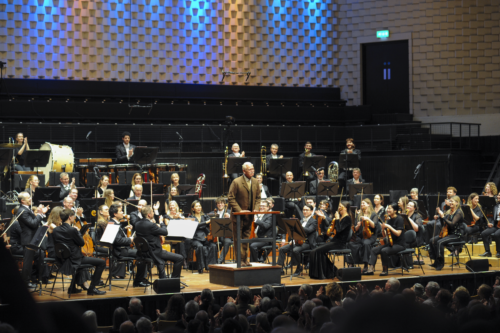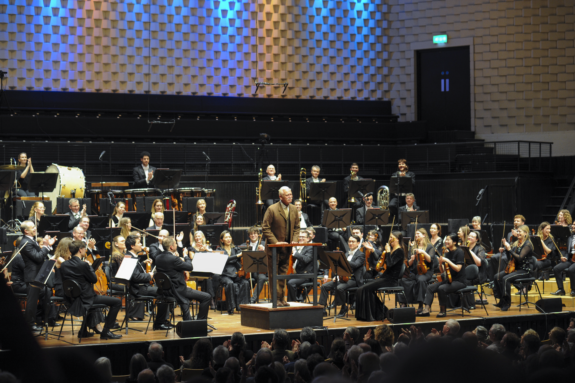 United Kingdom Brahms, Hough, Elgar: Sir Stephen Hough (piano), Walter van Dyk (speaker), Bournemouth Symphony Orchestra / Mark Wigglesworth (conductor). Lighthouse, Poole, 27.2.2025. (CK)
United Kingdom Brahms, Hough, Elgar: Sir Stephen Hough (piano), Walter van Dyk (speaker), Bournemouth Symphony Orchestra / Mark Wigglesworth (conductor). Lighthouse, Poole, 27.2.2025. (CK)

Brahms – Symphony No.3
Hough – Piano Concerto (The World of Yesterday)
Elgar – Enigma Variations (narrated)
In my salad days, when I was green in judgement, Mahler was the sun, Bruckner was a mysterious nebula, avant-gardistes like Harry and Max were shooting stars, and Brahms was nowhere. With age has come a modicum of sense, and I am now able to enjoy lovely Brahms performances like this Third Symphony from Mark Wigglesworth and the Bournemouth Symphony Orchestra.
Wigglesworth had the strings seated differently from their usual arrangement – first and second violins left and right, double basses on the left – and drew from them a marvellously warm and rich sound, just as he did with the Second Symphony a few weeks ago (review here). Again he conducted without a score, and again he seemed able to communicate with the players through the swaying of his body is sympathy with the music as much as through the movement of his hands. The orchestra responded with a superbly blended Brahmsian sound – violas and solo horn outstanding, with mellifluous woodwind. The third movement’s plangent theme was allowed to register in all its richness at a natural tempo, and the finale’s loping tune was borne up on a swell that built powerfully to the movement’s climax – as dramatic as anything in the First Symphony – before ebbing peacefully to the close. In May, conductor and orchestra face the different challenge of the Fourth Symphony: I am looking forward to that.
I was intrigued by the prospect of Sir Stephen Hough’s Piano Concerto (played, of course, by himself). It is subtitled The World of Yesterday – the title of Stefan Zweig’s marvellous memoir about the heyday of fin-de-siècle Vienna and its subsequent collapse (do read it – I recommend Anthea Bell’s translation, published by Pushkin Press). I was led further up the garden path by Hough’s brilliant programme note (like John Adams, Hough’s verbal virtuosity sometimes threatens to outshine his music). It was clear that the Waltz – that quintessentially Viennese dance form – was to play an important role in the concerto: this had me remembering that Carl Schorske’s classic Fin-de-Siècle Vienna: Politics and Culture opens with a description of Ravel’s La valse as a depiction of Vienna dancing on a volcano to its destruction.
Well – if you are still with me – the music proved, to my discomfiture and delight, that I was barking up entirely the wrong tree: it is not about Things Falling Apart, it is about nostalgia – a blissful antipole, perhaps, to Ravel’s doom-laden La valse, though it matches it in brilliance and virtuosity. It opens with a rather gorgeous orchestral introduction – bubbles floating up lazily on clarinet and harp – followed by a solo piano entry so lush that we might have wandered into Respighi’s Pines of the Janiculum. Glittering cascades lead to the emergence of an almost embarrassingly beautiful waltz. It is some time before piano and orchestra play together: fugitive strings curl like wisps of smoke and coalesce into a full-blown Palm Court waltz, with piano decoration, which is then treated to a sequence of variations. The music increases in excitement and brilliance; there is a faster, virtuosic episode for piano with xylophone, and a grand tutti, after which we seem to have reached a spacious lyrical plateau with a lovely high-lying trumpet, and horns…
And so on, the piano in an increasingly dazzling moto perpetuo, the trumpets crackling away, to a sparkling finish. Huge fun. I think we would all have been delighted if Sir Stephen and the orchestra had encored the whole thing.
This concert held out another intriguing prospect: Elgar’s Enigma Variations were to be ‘narrated’. I was probably not the only audience member to feel sceptical, apprehensive even, about this: why disturb the flow of Elgar’s music, chop it up into 15 bite-sized chunks separated by lengthy bouts of turgid prose?
We need not have worried: this was no gimmick. The spoken narration, compiled by Mark Wigglesworth from Elgar’s own writings, gave us no more than a brief signpost for each variation, sketching the music’s character and background as deftly as a skilful annotator might. In the early variations, music and words flowed easily as an unbroken sonic experience; only after Nimrod, the tribute to the cellist Basil Nevinson and the Romanza was a brief pause allowed, as the music demands.
Actor/narrator Walter van Dyk sat above the orchestra, on his own, off to the left. An experienced performer in musical contexts, he proved a more than passable Elgar impersonator: his voice, mellow with a touch of world-weariness, was ideally suited to his role, sensitive to the music and in sympathy with it – almost, at times, an extension of it. At no point did his words seem an intrusion; he always sounded natural, never self-consciously thespian. It was a much more moving experience than I had anticipated. As his own climactic Variation got under way, he took his coat and hat and unobtrusively left the stage: his last words, ‘I ask nothing’, left us wondering whether this was a proud assertion of his artistic independence or, like King Lear’s nothing, a bleaker epitaph.
His performance, along with the playing of the Bournemouth Symphony Orchestra, continues to resonate with me: in my memory it may prove harder to detach them from each other than I could have anticipated.
Chris Kettle
